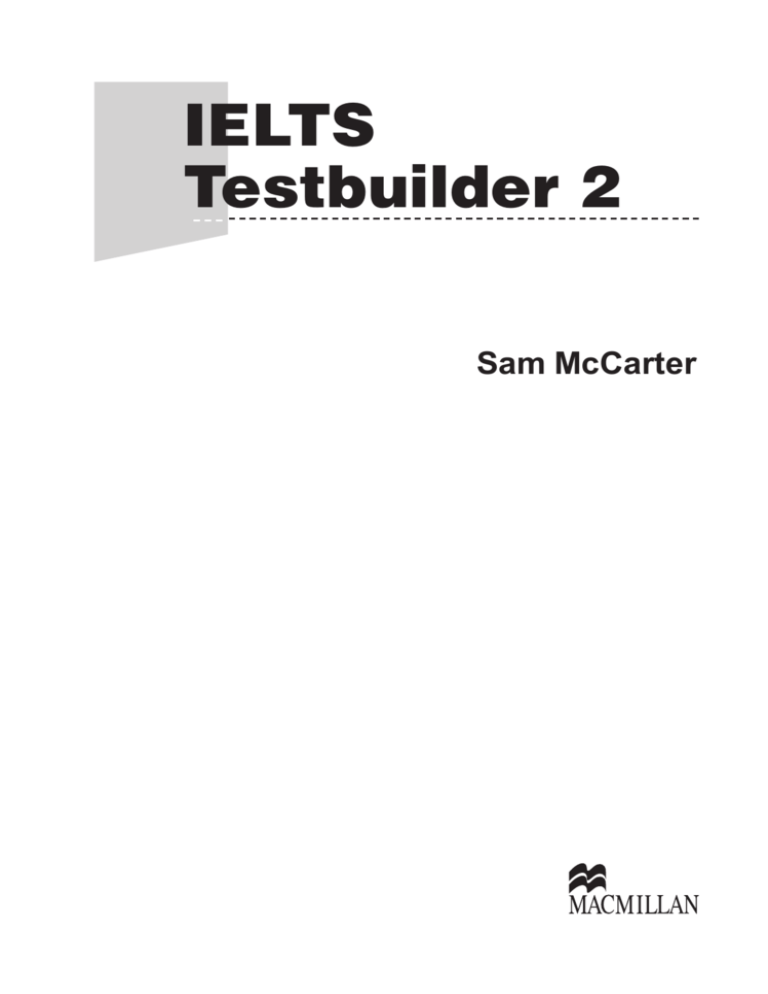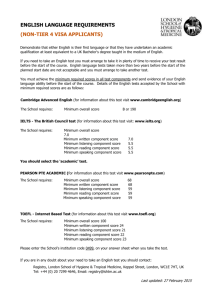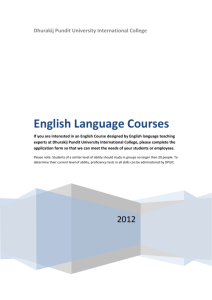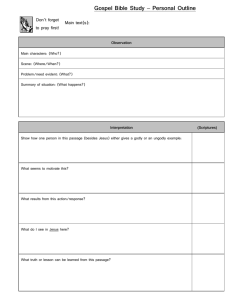
IELTS
Testbuilder 2
Sam McCarter
Macmillan Education
4 Crinan Street
London N1 9XW
A division of Macmillan Publishers Limited
Companies and representatives throughout the world
ISBN 978-0-230-02883-8
Text © Sam McCarter 2008
Design and illustration © Macmillan Publishers Limited 2008
First published 2008
All rights reserved; no part of this publication may be reproduced, stored in a retrieval
system, transmitted in any form, or by any means, electronic, mechanical, photocopying,
recording, or otherwise, without the prior written permission of the publishers.
Designed by eMC Design Ltd, www.emcdesign.org.uk
Illustrated by eMC Design Ltd, Martin Sanders
Cover design by Macmillan Publishers Limited
Cover photograph by Image Source
Authors’ acknowledgements
I would like to thank Micky Silver for the article on left-handedness p78 and Wendy Riley
for Physician, Rule Thyself! p83. I would also like to say a special thank you to Xanthe Sturt
Taylor for her patience. I would also like to thank the following students for the writing
samples: Bassam Khalil, Abdulkadir Hadi, Luse Kanumuangi, Abukar Haji Jimale, Wilonja
Mutebwe.
The publishers would like to thank Liz Hunt and Edward Lee for their help.
The author and publishers would like to thank the following for permission to reproduce
their photographs: Alamy / John Arnold Images p102, Alamy / Jenny Hart p21, Alamy /
David Wall p72; Corbis / Edward Block p54 Corbis / Horace Bristol p44, Corbis / James
Richardson pp112, 113; Getty / Superstudio p16.
The author(s) and publishers are grateful for permission to reprint the following copyright
material: Australian Academy of Technological Sciences and Engineering (ATSE) for the
diagram “Water recycling in Australia” published on www.atse.org.au © ATSE 2004 p87;
The Economist for an extract from “Much ado about almost nothing” published in The
Economist 18th March 2004 © The Economist Newspaper Limited, London 2004 p112;
Extract from “History of Blue Plaques Scheme 2” published on www.english-heritage.
org.uk, © Emily Cole used by permission of the author p102; Professor Michael D.
Guiry, Martin Ryan Institute for extracts from www.seaweed.ie p44; Office for National
Statistics for the diagrams “Transport Highlights, Passenger railway journeys, GB’’ p30
and “Working Lives: Half of women’s jobs are part time – All in employment: by sex
and occupation, 2005, UK” p115 © Crown copyright, and facts from “Participation: More
volunteers from higher income homes” from the Home Office Citizenship Survey, 2001 p27
© Crown copyright, all published on www.statistics.gov.uk; Te Ara, Encyclopedia of New
Zealand for information about caves by Leslie Owen Kermode, B.A., Geological Survey
Station, Department of Scientific and Industrial Research, Otahuhu published on www.
teara.govt.nz p72; Cambridge ESOL for an extract adapted from IELTS Practice Materials
and candidates Booklet © 2006 p7.
These materials may contain links for third party websites. We have no control over, and
are not responsible for, the contents of such third party websites. Please use care when
accessing them.
Although we have tried to trace and contact copyright holders before publication, in some
case this has not been possible. If contacted we will be pleased to rectify any errors or
omissions at the earliest opportunity.
Printed and bound in Hong Kong
2012 2011 2010 2009 2008
10 9 8 7 6 5 4 3 2 1
C ONTENTS
Introduction
4
TEST ONE
Listening
8
TEST THREE
Listening
66
Further practice for Section 1
67
Further practice for Section 3
70
Further practice for Sections 1 and 2
11
Academic Reading
72
Academic Reading
15
Further practice for Reading Passage 1
76
Further practice for Reading Passage 1
19
Further practice for Reading Passage 2
82
Further practice for Reading Passage 2
25
Further practice for Reading Passage 3
86
Academic Writing
30
Academic Writing
87
Further practice for Task 1
31
Further practice for Task 1
88
Further practice for Task 2
90
Speaking
35
Further practice for Speaking
36
Speaking
92
Further practice for Speaking
93
TEST TWO
Listening
37
TEST FOUR
Further practice for Section 3
41
Listening
95
Further practice for Section 4
43
Further practice for Section 2
97
Further practice for Section 4
101
Academic Reading
44
Further practice for Reading Passage 1
47
Academic Reading
102
Further practice for Reading Passage 2
52
Further practice for Reading Passage 1
106
Further practice for Reading Passage 3
57
Further practice for Reading Passage 2
111
Academic Writing
59
Academic Writing
115
Further practice for Task 1
60
Further practice for Task 1
116
Further practice for Task 2
62
Further practice for Task 2
118
Speaking
64
Speaking
119
Further practice for Speaking
65
Further practice for Speaking
120
Key and explanation
122
Listening scripts
153
Sample answer sheets
173
IELTS Results
175
CD Track listing
176
T EST ONE
Listening
approximately 30 minutes
Note that you will hear each section once only in the exam.
Before listening to the recording and completing Sections 1–2, go on to pages 11–12.
Section 1
Questions 1–10
Questions 1–4
Complete the notes below.
Write NO MORE THAN THREE WORDS AND/OR A NUMBER for each answer.
ITALIABREAKS
Example
Destination
Venice
Name
John
1
Mobile number
07987
2
Number of people
Two adults
Holiday length
3
Hotel Scotland
4
star
Questions 5 and 6
Choose TWO letters A–E.
Which TWO good things about Hotel Scotland are mentioned?
A restaurant
B
convenience
C room with a terrace
D large rooms
E
cleanliness
T EST ONE
Listening
Questions 7–10
Write NO MORE THAN THREE WORDS AND/OR A NUMBER for each answer.
.
7
The departure date is
8
The holiday excluding insurance costs £
9
The discount is
10
The booking reference is
.
per cent if booked before 17th February.
.
Stop the recording when you hear ‘That is the end of Section 1’. Now check your answers.
9
10
Listening
Section 2
TEST ON E
Questions 11–20
Questions 11–13
Write NO MORE THAN THREE WORDS for each answer.
11 The land for development has not been used for over a
.
on the land.
12 There was pressure to build a training centre and a
13 Sponsorship has been received from a number of
.
Questions 14–20
Label the plan below.
Write NO MORE THAN THREE WORDS for each answer.
Stop the recording when you hear ‘That is the end of Section 2’. Now check your answers.
T EST ONE
Further practice and guidance
Further practice for Listening Sections 1 and 2
The questions below help you make sure you
have chosen the correct answers for questions
1–20 in Sections 1 and 2.
Completing sentences
Personal details
1
Look at Questions 7–10 on page 9 and answer the
following:
Before you listen, use these questions to help
you predict when to listen carefully for the
answers.
Which word or phase in each list below is
not related to the word in italics?
7
departure
start (out)
date you want to leave
return date
go away
when
8
cost
price
fee
pay
save
how much
9
discount
reduction
additional charge
less
(money) off
special offer
Predict the type of questions which are asked to
obtain information.
Look at Questions 1–4 on page 8. What questions
can the Receptionist ask to obtain the information?
You can use the following: What/How/How long …?
or Can/Could you tell me ...?
1
2
10 booking
3
reservation
part-payment
reserve
cancellation
put name down for
4
2
Does the Receptionist provide all the
information in questions 7–10?
11








